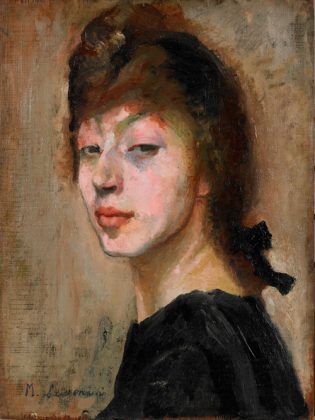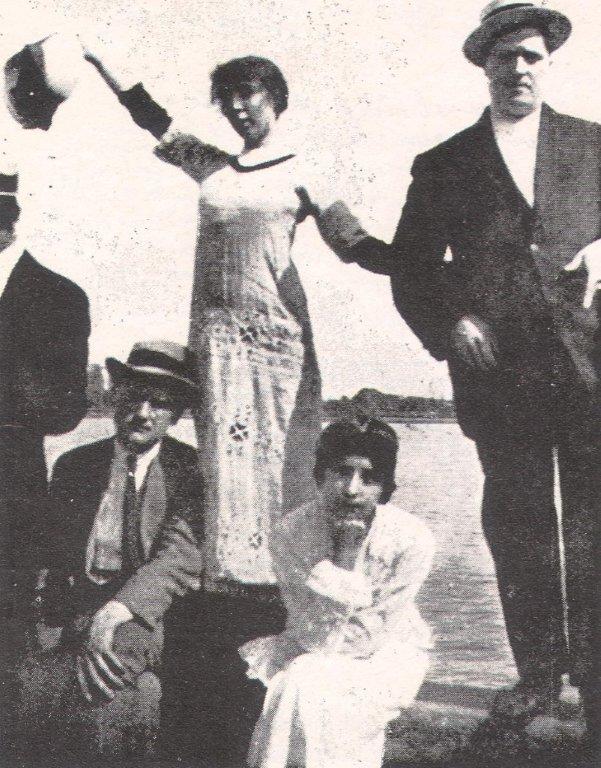Oda en la muerte de Tolstoi
Alta encina y oráculo, milagro de la tierra,
que hablaba estremecida del viento de la mar:
hoy, en el corazón antiguo de la sierra,
la mano se ha secado que la pudo plantar:
la que estallaba en rojos rayos de profecías
y echaba por las tribus bendiciones de pan;
la que, en la sal del llanto que llora Jeremías,
amasaba las ásperas harinas de su pan.
(Porque, desde la noche primera de los días,
los hijos de los hombres no se redimirán.)
Inmensidad de cielo y mar,
alta virtud de consolar,
de alimentar, de perdonar
– oh Satanás – y de matar.
Alegría funesta, consuelos enemigos,
piedad sañuda y flora turbia de bien y mal:
limosna de la muerte, que alarga a los mendigos
en ademán de dádiva la hoja del puñal.
La cruz de aquel profeta, larga como un gemido,
subía hasta las nubes en pos de tempestad:
por ella descendía el dragón encendido
a devorar el fruto de la posteridad.
(Porque la humanidad es perenne gemido,
y es mejor no nacer para la humanidad.)
Desolación, desolación.
Es nuevo Herodes la razón;
sea, en el ara del perdón,
la humana mies, degollación.
Con la sabiduría clásica del Sileno,
avanza por los campos de hielo el redentor;
el carro de su voz rodaba como un trueno,
su frente era promesa, sus ojos estupor.
Venerable como un tronco vestido de heno,
el redentor tenía la cara de Moisés.
Bajo el cabello, lívido reverberar de plata,
cogiosa barba llueve como una catarata.
Lleva alas de relámpago prendidas a los pies.
Cuando deja salir la voz a predicar,
es como si gritara súbitamente el mar.
Desolación, desolación.
Maldita está la Creación,
y es una larga convulsión
el palpitar del corazón.
Y el coro de los pueblos hierve como la espuma
– oh asalto de las olas –, persigue al redentor;
el vaho de los hombres forma en el éter bruma,
y la tierra se moja de llanto y de sudor.
(Flota en la estepa un vívido reverberar de plata
que llueve de la tarde como una catarata.)
y la terrible boca pronuncia la sentencia,
y ardiente espada surge de la terrible boca;
consúmese a lo lejos el Árbol de la Ciencia,
y el Arca de Noé se parte en una roca:
“Hermanos, replegaos al útero materno.
Abrid tumbas, la vida es vergüenza y error.
La carne de los hombres es pasto del Infierno.
La Creación es mancha del manto del Señor.”
Inmensidad de cielo y mar,
alta virtud de consolar,
de alimentar, de perdonar
– oh Satanás – y de matar.
Ode on the Death of Tolstoy
Great oak and oracle, and earthly miracle,
who spoke when shaken by wild winds of sea,
to-day in highland’s primeval heartland
the hand is parched that had planted thee.
Red rays of warning in bursts were streaming!
You blessed the tribes with the gift of bread;
and in the salt tears that Jeremiah shed
you heaped the coarse flour of your grain,
for since the first night of the noon-days
there’s no redeeming the sons of men.
Immensity of sky and sea,
grace of consoling lenity,
to feed, to take our sins away –
O Satan, Satan – and to slay.
Joy like a corpse, comforter malignant,
raging saint, grime-flower of good and ill:
death’s coin of mercy that offers beggars
the seeming gift of the blade of daggers!
The prophet’s cross, longer than a groaning,
ascended cloud-high to vex the storm,
down which descending the fiery dragon
devoured the fruit of the yet unborn.
(For man is one everlasting groaning,
the best for man, never to be born.)
Desolation, desolation,
Herod is reborn as Reason;
at the altar-rail of pardon
let man’s harvest be beheading.
With classic wisdom of old Silenus,
through icy plains the redeemer made his way.
His voice’s ox-cart rolled on like thunder,
his brow spoke promise, his eye a dreamer’s,
the face of Moses was this redeemer’s,
a stately tree-trunk all hung with hay.
Below his hair, livid silver drum-beat,
his beard like white-water-shock was raining,
with wings of lightning his feet were shining,
and when he turned loose his voice to preaching,
it seemed a sudden shouting of the sea.
Desolation, desolation,
accursed is all creation,
a drawn-out convulsion
the heart’s palpitation.
The troop of peoples like sea-froth seething –
O surging waves – rounds on the redeemer;
the human vapour befogs the ether,
the earth is wet with its sweat and weeping.
(Across the steppe, vivid silver drum-beat,
white water foaming, rains down at evening.)
The fearsome mouth speaks the judging word,
the fearsome mouth wields the burning sword;
the Tree of Knowledge far off is tinder,
the rock has split Noah’s Ark asunder:
“O brothers, brothers, unseal the tomb,
fall back, return to our mother’s womb,
for life is shame, life is false accord,
men’s flesh is feed for the hosts of hell,
and Creation a stain on the raiment of the Lord.”
Immensity of sky and sea,
grace of consoling lenity,
to feed, to take our sins away –
O Satan, Satan – and to slay.

